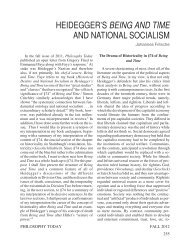Why Saying “I'm Sorry” Isn't Good Enough: The Ethics of Corporate ...
Why Saying “I'm Sorry” Isn't Good Enough: The Ethics of Corporate ...
Why Saying “I'm Sorry” Isn't Good Enough: The Ethics of Corporate ...
Create successful ePaper yourself
Turn your PDF publications into a flip-book with our unique Google optimized e-Paper software.
<strong>Ethics</strong> <strong>Corporate</strong> Apologies<br />
our <strong>of</strong>fices undergoes a more rigorous review” (Patel, 2009, 1). By printing the apology<br />
in the industry’s flagship magazine Advertising Age, DDB Worldwide helped educate<br />
competitors about the need to monitor rigorously all work, including work for not-for-<br />
pr<strong>of</strong>its. In a similar vein, CEO Toyoda’s apology, while falling short in some respects,<br />
was ethically good ins<strong>of</strong>ar as he began his talk by making Toyota’s plans to improve their<br />
cars a central part <strong>of</strong> his apology (Montopoli, 2010). Not surprisingly, the media and the<br />
larger public generally gave Toyoda pretty high marks for his willingness to discuss<br />
candidly how Toyota had lost its way and what measures it was pursuing to restore the<br />
quality consumers had come to expect from the Toyota brand.<br />
Speaker regret manifesting itself in changed behavior is a crucial factor when making an<br />
apology. If the speaker can specify future plans to act in a more responsible and caring<br />
way, the audience will interpret the speaker’s emotions as more authentic because the<br />
expressed emotions are more moving—their effect is extending from the present into the<br />
future. This continuity <strong>of</strong> emotions reinforces a perception that the speaker’s character is<br />
changing for the better. <strong>The</strong> recipients <strong>of</strong> the apology are witnessing the emergence <strong>of</strong> a<br />
new and more virtuous set <strong>of</strong> habits or ethos on the part <strong>of</strong> the firm and its CEO. <strong>The</strong><br />
audience can thus legitimately hope for an altered and better future for themselves as<br />
well. That hope, in turn, curtails any feelings <strong>of</strong> rage and fear, thereby predisposing them<br />
to repose more trust in the firm and its brand.<br />
Of course, the CEO and firm will need to embark upon a concrete plan to realize the<br />
stated corrective steps. That is why some audience members take a “wait and see”<br />
attitude before accepting an apology as such. If a CEO promises reparations and then<br />
does not make the specified payments, or if the CEO commits to putting a more rigorous<br />
40

















